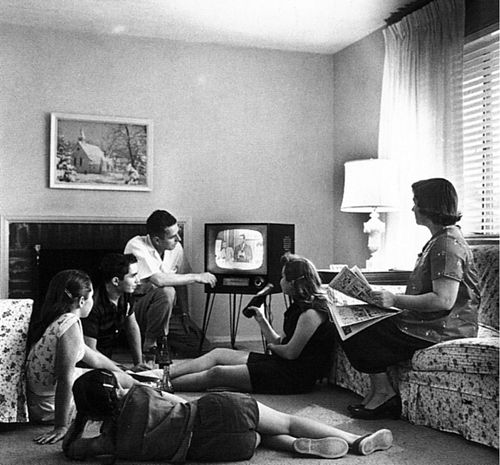While so-called polarization and ideological divides (mass disinformation campaigns and the lack of grassroots citizen input at all levels) create a lot of noise in what passes for discourse in modern American media, everyone can agree on one thing: parents and the family are to blame for whatever ails our children. Parents who just don't do a good job, families that are not two-parent, parents who won't turn off the TV, or parents who don't care: there is a boatload of blame directed at the family. Even among homeschoolers, the family blame game is popular.
 |
| via Wikimedia |
It didn't seem that way, of course, at first. New schools themselves were a community resource, attendance was fairly short in length of time, and in the flow of growth that industrialization brought to the wealthy and still resource-rich US, this transition was still one that brought good things to many people's lives. Deep structural issues, like the fact that families now had no input into their children's educational choices or studies and the hierarchical sorting and ranking to cull out the top, a Prussian method, were not fully felt when the bulk of jobs were unrelated to schooling. Maybe you were not the favorite in the one-room schoolhouse but until the 1920s, most jobs were in local businesses and communities and unrelated to school. After the depression, there were many, many new jobs being created by the industrial economy and the high scgool degree was a credential of real value.
Whatever families felt as compulsory attendance was lengthened, and lengthened (schools became addicted to legal power over families, it made a lot of things much simpler), it was also a free resource and there was great investment in it. Schools were a workable way to go forward for vast numbers. In the apartheid of the South this was not the case, and many Afruian-Americans would migrate to other areas. But the West was growing and the many new jobs within the school system itself were a boon in many parts of the country. Strong communities and jobs unrelated to schooling as well as vitamins in the food all helped compensate for dysfunctional methods that we still use.
The 1920s saw, for the first time, a majority of families no longer living on the farm, the social safety net of its day. The car would keep the family moving, first into cities and then out again to suburbs. Extended families became the nuclear families of post WWII which have become the single-parent families of today.
My point is this: the context, the nature of communities surrounding schools has completely changed. Families, jobs, neighborhoods, food and more, it has all changed. Schools fit into a specific context and schools must change to provide the support they once did in a different time.
Compulsory attendance is an example of a design flaw, a mechanism that ignores the social reality of families and works against that instead of strengthening that and working with it. In the 20th century, the brand new nation-state has been struggling to maintain itself against extreme inequality and broken political, economic and social systems. There have been many failures and effective administration of the nation-state is critical to stability. Extreme inequality is a warning sign that recent experience should flag immediately. Developing social, political and economic institutions that are sustainable is a global imperative.
Learning is a natural human activity, literacy is not more important than democracy and sustainable relationships, it is simply a skill among many. We can value the provision of learning services for families and children. The building of school spaces and establishing of learning services is a good thing. But the administration of these services should be democratic. There is reason to believe that changing our compulsory model of schooling would open up new ways of strengthening our communities and the social relationships within them. Homeschooling is a spontaneous grassroots movement by citizens to reclaim family life and learning from mass institutions.
It isn't the family that is to blame for school problems. It is the schools that have damaged our families by not allowing families to be involved in any meaningful way, by dropping alternative paths instead of expanding them, by demanding homework and fess that eat into working-class time and money, by policies all designed to assume that families are static and parents are best ignored. Supporting a healthy educational and social life for families in a society of uneven wealth means schools need to be flexible and value far more than academic achievement.
No comments:
Post a Comment